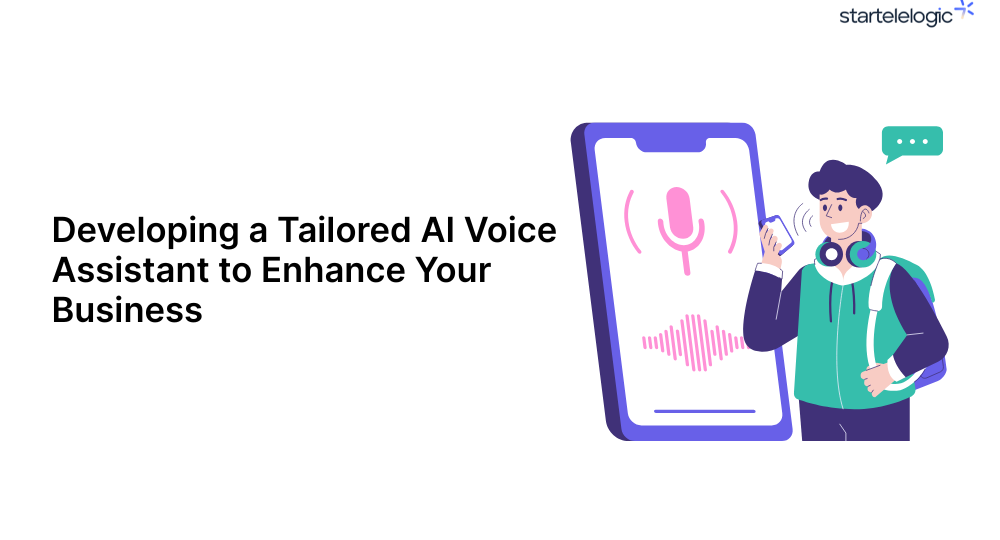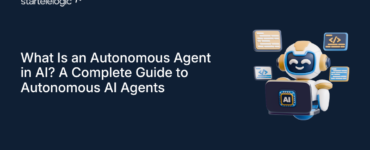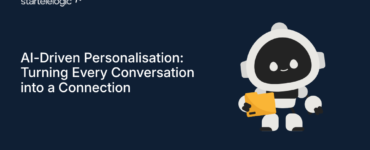Why AI Voice Assistants Are Becoming Essential?
Voice technology is no longer a futuristic dream—it’s shaping the way people interact with technology today. According to Juniper Research, over 8.4 billion voice assistants are expected to be in use globally by 2024, a figure surpassing the human population. Similarly, PwC research shows that 65% of 25–49-year-olds use voice assistants daily, making it one of the fastest-growing interfaces in the digital ecosystem.
For businesses, this growth presents a massive opportunity. Customers now expect instant, hands-free, and personalized interactions. A Custom AI Voice Assistant allows your brand to meet those expectations while gaining a competitive edge. Unlike general-purpose assistants such as Siri, Alexa, or Google Assistant, a tailored solution can be built to align with your brand’s voice, serve your unique audience, and handle specialized tasks.
In this article, we’ll explore everything you need to know about developing a custom AI voice assistant—from benefits and design considerations to challenges, real-world applications, and future trends.
What is an AI Voice Assistant?
An AI voice assistant is an artificial intelligence-powered application that uses natural language processing (NLP) and speech recognition to understand and respond to voice commands. It allows users to interact with devices, software, or services through voice rather than typing or clicking.
Well-known examples include Apple’s Siri, Amazon Alexa, Google Assistant, and Microsoft Cortana. But while these assistants are useful, they are built for a broad audience, not customized for specific business needs.
That’s where a custom AI voice assistant comes in—designed and developed specifically to serve your customers, employees, or processes.
Why Your Business Needs a Custom AI Voice Assistant
1. Personalized Customer Experience
Customers prefer businesses that understand their needs. A custom AI voice assistant can greet users by name, provide product recommendations, and deliver support tailored to their past interactions.
2. 24/7 Availability
Unlike human agents, voice assistants don’t sleep. They ensure your business is always accessible, improving response times and customer satisfaction.
3. Brand Identity and Voice Consistency
A custom-built assistant can use a tone, vocabulary, and personality that reflect your brand. For example, a luxury brand may opt for a formal, elegant voice, while a youth-focused business may choose a casual, friendly tone.
4. Operational Efficiency
Routine tasks such as booking appointments, checking order statuses, or answering FAQs can be automated, freeing human staff for more complex responsibilities.
5. Accessibility and Inclusivity
Voice assistants enable people with disabilities or limited digital skills to engage with your services more easily, broadening your reach.
6. Competitive Advantage
In industries like retail, healthcare, and hospitality, adopting an AI voice assistant early gives your business a strong differentiation.
Key Steps in Developing a Custom AI Voice Assistant
Building a custom AI voice assistant requires a strategic approach. Here’s a detailed roadmap:
Step 1: Define Clear Objectives
Before diving into development, determine the primary role of your assistant.
- Will it serve customers, employees, or both?
- Should it focus on customer support, sales, internal productivity, or all three?
- What key problems should it solve?
Step 2: Choose the Right Technology Stack
Several platforms offer voice AI development tools. Popular ones include:
- Google Dialogflow – Great for NLP and integration.
- Amazon Lex – Seamless with AWS ecosystem.
- Microsoft Bot Framework – Enterprise-focused solution.
- Rasa – Open-source and customizable for businesses with in-house tech teams.
Step 3: Design Conversational Flows
Conversations should feel human-like and intuitive. Use conversation design principles, including:
- Anticipating multiple ways users may ask the same question.
- Providing fallback responses for unknown queries.
- Keeping answers concise but informative.
Step 4: Select the Voice and Personality
Decide how your assistant should sound—male, female, robotic, or natural. Modern AI tools even allow synthetic voices customized for tone, pace, and emotion.
Step 5: Integrate With Core Business Systems
The true power of a custom AI voice assistant lies in integration. Connecting it to your CRM, ERP, or booking system allows it to perform real actions like updating records, booking reservations, or checking stock availability.
Step 6: Test, Train, and Optimize
AI models improve over time. Regular testing and continuous training with new data ensure accuracy, relevance, and better customer satisfaction.
Challenges in Developing a Custom AI Voice Assistant
While the opportunities are huge, businesses should also consider potential challenges:
- High Development Costs – Advanced assistants with integrations and personalization can be expensive.
- Data Privacy Concerns – Handling sensitive customer data responsibly is crucial to maintain trust.
- Language and Accent Barriers – Speech recognition accuracy may vary across accents and dialects.
- User Adoption – Some customers may prefer human interaction, requiring blended support strategies.
- Ongoing Maintenance – AI assistants require continuous updates, training, and monitoring.
Real-World Applications Across Industries
Retail and E-commerce
- Product recommendations based on browsing history.
- Assisting customers with delivery tracking and returns.
Healthcare
- Appointment scheduling.
- Medication reminders and basic health FAQs.
Hospitality
- Hotel check-in assistance.
- Room service orders via voice commands.
Banking and Finance
- Voice-activated balance checks and transaction history.
- Personalized financial advice.
Corporate Environments
- Assisting employees with HR queries.
- IT support and troubleshooting via voice requests.
Future Trends in AI Voice Assistants
- Hyper-Personalization – Assistants will adapt responses based on mood, context, and history.
- Multilingual Support – Businesses will deploy assistants that seamlessly switch between languages.
- Voice Commerce (V-Commerce) – Shopping via voice will become a mainstream experience.
- Emotional AI – Advanced assistants will detect emotions from voice tone to deliver empathetic responses.
- Integration with Metaverse and AR/VR – Voice assistants will become key in immersive experiences.
Best Practices for Developing Your AI Voice Assistant
- Keep responses short and clear.
- Avoid overloading users with too much information.
- Use natural, conversational language.
- Provide an easy handover option to human support.
- Prioritize data privacy and compliance (e.g., GDPR, HIPAA).
Conclusion
Developing a custom AI voice assistant is no longer just a technological experiment—it’s a strategic investment for businesses aiming to thrive in a voice-first world. By offering personalized experiences, boosting efficiency, and strengthening brand identity, AI voice assistants empower businesses to stay competitive in rapidly evolving industries.
As adoption continues to rise, companies that embrace tailored voice solutions today will be the ones shaping customer expectations tomorrow.
FAQs About AI Voice Assistants
1. What is an AI Voice Assistant?
An AI voice assistant is software that uses NLP and AI to understand and respond to voice commands, enabling hands-free interaction with devices or services.
2. How can a Custom AI Voice Assistant benefit my business?
A custom AI voice assistant can enhance customer engagement, automate routine tasks, and reflect your brand’s personality while operating 24/7.
3. Is developing a Custom AI Voice Assistant expensive?
Costs vary depending on complexity and integrations, but a custom AI voice assistant is a long-term investment that improves efficiency and customer satisfaction.
4. What industries can benefit most from AI Voice Assistants?
Retail, healthcare, banking, hospitality, and corporate sectors all benefit significantly from adopting a custom AI voice assistant.
5. How do I ensure my AI Voice Assistant is secure?
To secure your AI voice assistant, follow data protection laws like GDPR or HIPAA, encrypt sensitive data, and regularly update your system.




